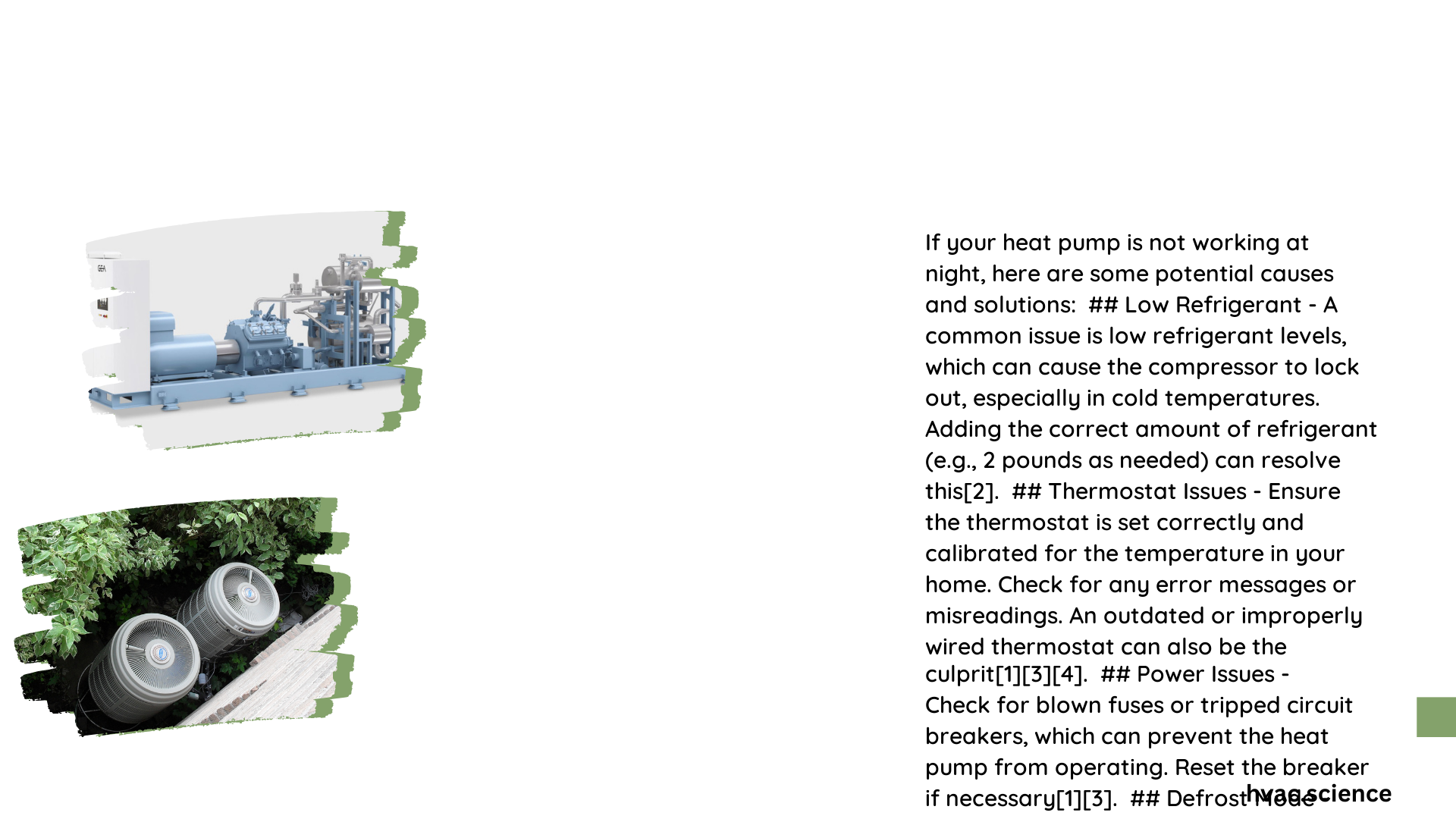Heat pumps not working at night can be a frustrating issue for homeowners. This problem often stems from various factors including electrical issues, thermostat settings, and outdoor temperature impacts. Common symptoms include the heat pump running constantly, failing to maintain desired temperatures, or not operating at all during nighttime hours. Understanding these issues and implementing proper troubleshooting steps can help resolve nighttime heat pump problems and ensure comfortable indoor temperatures throughout the night.
Why Is My Heat Pump Not Working at Night?
Heat pumps are designed to provide efficient heating and cooling year-round. However, several factors can cause them to malfunction or underperform during nighttime hours. Let’s explore the common causes and solutions for heat pumps not working at night.
What Are the Electrical Issues That Can Affect Nighttime Heat Pump Operation?
Electrical problems can significantly impact your heat pump’s performance, especially at night. Here are some key issues to consider:
- Condensate pump malfunctions
- Power supply interruptions
- Faulty wiring or connections
To address these issues:
- Check the condensate pump for proper operation and power supply
- Inspect the main electrical panel for tripped breakers
- Have a professional electrician examine the wiring and connections
How Do Thermostat Settings Impact Heat Pump Performance at Night?
Incorrect thermostat settings can lead to heat pump issues during nighttime hours. Consider the following:
- Drastic temperature setbacks triggering auxiliary heat
- Unrealistic temperature expectations
To optimize your thermostat settings:
- Set realistic temperatures (e.g., 68°F in winter, 78°F in summer)
- Use a programmable thermostat for efficient nighttime operation
- Avoid large temperature swings between day and night settings
What Role Does Outdoor Temperature Play in Nighttime Heat Pump Issues?
Outdoor temperatures can significantly affect heat pump performance, especially at night. Key factors include:
- Extremely cold weather causing longer running cycles
- Poor home insulation leading to rapid temperature drops
To mitigate these issues:
- Ensure proper home insulation to maintain indoor temperatures
- Consider supplemental heating for extremely cold nights
- Schedule regular maintenance to optimize heat pump efficiency
How Can I Troubleshoot My Heat Pump Not Working at Night?

When your heat pump isn’t working correctly at night, follow these troubleshooting steps:
- Check voltage and amperage
- Inspect refrigerant levels
- Examine air filters and coils
- Verify defrost system operation
What Voltage and Amperage Checks Should I Perform?
Proper voltage and amperage are crucial for heat pump operation. Here’s what to check:
| Check | Normal Range | Action if Outside Range |
|---|---|---|
| Voltage | 220-240V | Contact an electrician |
| Amperage | Varies by model | Consult a HVAC professional |
Use a multimeter to measure these values at the electrical connections. If readings are outside the normal range, seek professional help.
How Do I Check Refrigerant Levels in My Heat Pump?
Low refrigerant levels can cause nighttime heat pump issues. While a professional should handle refrigerant checks, you can look for these signs of low refrigerant:
- Ice buildup on outdoor unit
- Warm air from vents in heating mode
- Hissing sounds near the indoor unit
If you suspect low refrigerant, contact a licensed HVAC technician for a proper inspection and recharge.
What Maintenance Tasks Can Prevent Night Malfunctions?
Regular maintenance is key to preventing nighttime heat pump issues. Here are essential tasks:
- Clean or replace air filters every 1-3 months
- Inspect and clean evaporator and condenser coils every 3-6 months
- Check the defrost cycle periodically
- Verify thermostat settings and home insulation
Implementing these maintenance tasks can significantly improve your heat pump’s nighttime performance and overall efficiency.
What Are the Cost Implications of Repairing a Heat Pump Not Working at Night?
Understanding the potential costs associated with heat pump repairs can help you make informed decisions. Here’s a breakdown of possible expenses:
How Much Do Heat Pump Service Fees Typically Cost?
Service fees for heat pump repairs can vary based on location and issue complexity:
- Average service fee range: $75 – $200
- Emergency or after-hours service may incur additional charges
What Are the Typical Costs for Heat Pump Parts Replacement?
Part replacement costs can vary widely depending on the component:
| Part | Estimated Cost Range |
|---|---|
| Compressor | $500 – $2,000 |
| Thermostat | $50 – $200 |
| Capacitor | $100 – $400 |
| Reversing valve | $300 – $600 |
Are There Potential Energy Efficiency Upgrades to Consider?
Investing in energy efficiency upgrades can lead to long-term savings:
- Upgrading to a more efficient heat pump: $2,000 – $7,000+
- Installing a programmable thermostat: $100 – $300
- Improving home insulation: Varies based on home size and insulation type
While these upgrades have upfront costs, they can significantly reduce energy bills and improve comfort, especially during nighttime operation.
By understanding the causes, troubleshooting steps, and potential costs associated with heat pumps not working at night, you can take proactive measures to ensure your system operates efficiently throughout the night, providing consistent comfort for you and your family.
